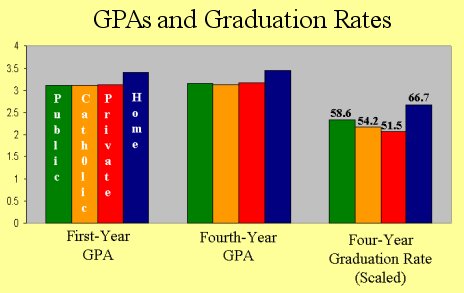
Of course, a lot of universities recognize this fact. IUPUI in Indianapolis, Indiana makes it very clear on their website. They say:
Over 150 students have enrolled at IUPUI with home school backgrounds and as a group these students have academically excelled and out-performed the general student population.
Stanford University (like most serious universities) actively recruits homeschoolers, and they accept a higher percentage of their homeschooled applicants than the rest of their applicant pool. Jonathan Reider, an admissions officer at Stanford university explains why:
The distinguishing factor is intellectual vitality. [Homeschooled] kids have it, and everything they do is responding to it.”
Boston University agrees. They followed their homeschool graduates for several years and found their average GPA was 3.3 out of 4.1 That’s a sold “B.”
It’s not surprising, then, that when other universities examine their homeschooled population, they find real success.
The most recent study on this comes from The University of St. Thomas. They studied their student population and split them into four groups: those who graduated from public schools, those who graduated from private Catholic schools, those who graduated from private non-Catholic schools, and those who graduated from homeschools. Here is a graph that summarizes their major findings:2

Notice that whether we look at their first-year GPA, their fourth-year GPA, or their graduation rate, homeschool graduates (represented by the blue bars) are simply a cut above the other students. That’s what I saw when I was on the faculty at Ball State University, and that’s what the studies continue to show.
Now please note that while this study is informative, it has one major flaw. The sample of homeschooled students was small (just over 70). Thus, you probably can’t draw any firm conclusions from just this study. However, when you combine it with the other information I have discussed in this post, a pattern clearly emerges. That pattern is one of homeschooled students being very successful at college.
REFERENCES
1. Daniel Golden, “Home-Schooled Kids Defy Stereotypes, Ace SAT Test,” The Wall Street Journal, February 11, 2000, p 1.
Return to Text
2. Cogan, Michael F., “Exploring Academic Outcomes of Homeschooled Students,” Journal of College Admission, Summer 2010. (Available Online)
Return to Text

I’m enrolled, currently, at Rasmussen College which is a business school. I’m studying accounting (although most of the time it seems rather that I’m provided with gen-eds), and I’m kind of wishing that it were possible just to study the subject, and college subjects in general, autodidactically rather than have to pay $500 per credit hour. The exam for the CPA requires 150 credit hours though, requiring college and the expensive bill afterward. I would rather that it were possible just to take whatever examinations necessary to demonstrate knowledge and comprehension of the subjects I want to learn. If that were possible, then I could study on my own, be able to read the textbooks completely rather than merely rushing through them to meet arbitrary deadlines, and in the end I would be able to remember and understand more of the subject matter and it would only cost me the price of the textbooks and any lab equipment if needed. It would be much easier to learn college subjects on my own, but it seems as though there is a pervasive notion that spending a few myriad dollars is the only way to learn.
Ben, the argument is that these qualifying exams (like the one you need to take to be a CPA) can only test certain things. As a result, the only way to make sure you are “completely” prepared for your profession is to have an accredited degree. There is some validity to that argument, but probably not as much as most people think.